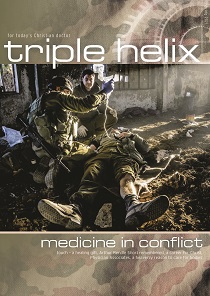'For I was hungry and you gave me something to eat, I was thirsty and you gave me something to drink, I was a stranger and you invited me in, I needed clothes and you clothed me, I was sick and you looked after me, I was in prison and you came to visit me.' Matthew 25:35-36
There are many inequalities in our world. The news is full of images of people facing the consequences of natural disasters, oppression, or disease. Through participation in the new 'Health and Justice Track' [1] run by CMF and Integritas Healthcare, [2] I have been challenged to develop my 'compassion permanence'. [3] This means not forgetting the world's injustices when we stop seeing them in the news or (more dangerously) becoming so accustomed to them that we accept them as normal. It would be all too easy to despair. So, rather than letting such stories overwhelm or numb us to the point of inaction, we must instead learn to turn to God to guide us on what action to take.
In the parable of the sheep and goats, [4] Jesus sets us apart as children of God through our compassionate responses to our fellow humans. Our service of others reflects our love for Christ. And just as Jesus demonstrated how to show compassion and love to those considered the least in society, we also have a responsibility to care and advocate for the vulnerable.
When we place our hope in Jesus Christ, we anchor ourselves to the truth that God is enough and can change circumstances, conditions, and structures. God's kingdom is not yet fully here, but we are placed in this broken world to participate in bringing life under his rule and reign. [5] In the story of the good Samaritan, [6] we are shown how to respond to seeing someone broken, poor and desperate for help. The Samaritan did not hesitate to risk his own safety or money to meet the needs of the person in front of him. Nor did he see the cultural or religious difference between them.
We should not miss any opportunity to imitate the 'Great Samaritan' that is Jesus Christ in acknowledgement of his sacrifice to meet our own spiritual poverty, debt, and brokenness.
Whether it is a short or long-term mission trip, charitable fundraising, or signing petitions and raising awareness on social media, there are many ways to be involved in advocating and acting for the vulnerable. When you ask God what opportunities there are, you will find he will do extraordinary things through you.
Esme MacKrill is an FY2 Junior Doctor in Southwest England































